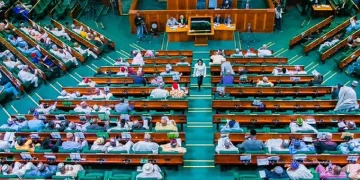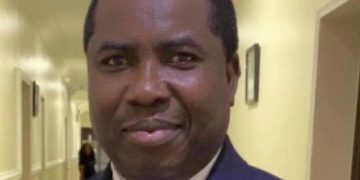Members of the House of Representatives have called on the Federal Government to implement a living wage for Nigerian workers to address continuous cases of industrial actions by organised labour.
The House resolution followed the adoption of a motion of urgent public importance moved by the member representing Balanga/Biliri Federal Constituency, Gombe State, Mr Isa Ali.
Ali led the debate on the floor of the green chamber during Wednesday’s plenary. He noted that the Federal Government and labour unions have been locked in negotiations over an upward review of the minimum wage, regretting however, that meetings so far failed to yield positive outcomes.
The lawmaker, a member of the Peoples Democratic Party also called for a review of the National Minimum Wage Act of 2019, noting that the prevailing circumstances which led to the enactment of the Act a few years ago have changed.
He said, “The National Assembly repealed and enacted the National Minimum Wage Act 2019 to fix the minimum wage at N30,000 even when the executive arm had suggested N27,000 at the time.
“In line with Section 3(4) of the Act, the extant minimum wage which commenced on April 18, 2019, has expired after five years on April 18, 2024, thereby calling for a further review of the existing Act.
He further argued that the payment of N35,000 wage award to public servants as a way of cushioning the effect of the economic hardship in the country has not addressed the challenges faced by Nigerian workers.
Following the debate, Kingsley Chinda, the House Minority Leader, urged the parliament to pass a New Wage Act immediately in the same manner the National Anthem Bill was passed recently.
“Section 14 of the constitution provides for the security and welfare of the people. Can we say we have carried out that function of governance? Can we say we have provided security and welfare for Nigerians? The answer is NO!” he said.
“I want to say that we should pass a New Wage Act with the speed we passed the National Anthem Act,” he added. He also noted that even if the President fails to sign it, the parliament can veto the Act.
“Let us recall the Minimum Wage Act and pass it and if the president refuses to sign, then we override him,” he added.
In the same vein, the member representing Dala Federal Constituency, Kano State, Ali Madaki maintained that the fight against corruption cannot be successful unless workers earn decent wages.
“We can not fight corruption if we don’t have a living wage. The House already adopted a motion on the living wage. Section 16 (2) of our constitution already covers it in the constitution. What Nigerian workers deserve is a living wage and not a minimum wage,” he said.
The Deputy Minority Whip, George Ozodinobi in his contribution, said it would be wrong to pay a minimum wage of less than N75, 000 which he said is the current price of a bag of rice in Nigeria.
“I advocate a benchmark of N75,000, which is the price of a bag of rice, while also considering other things like school fees, medicals, and other expenses,” Ozodinobi, a chieftain of the Labour Party said.
Following the adoption of the motion, the House urged the Federal Government to redirect the focus of the negotiations with labour unions from fixing a new minimum wage to fixing a realistic living wage for Nigerians, just as it demanded a downward review of electricity tariff ‘To reduce the suffering of Nigerians.”
A member of the ruling party representing Ikorodu Federal Constituency, Lagos State, Babajimi Benson called for restraint, noting that it is not enough to pressurise the Federal Government to pay a new wage.
“How are sure the private sector can afford the new wage (we are discussing)? It is not just to pressurise the government to pay say N100, 000. The minimum wage should not be an exclusive list issue because some states can pay higher than others. We are seeing Edo State, for instance, paying over N70, 000,” Benson said.
























